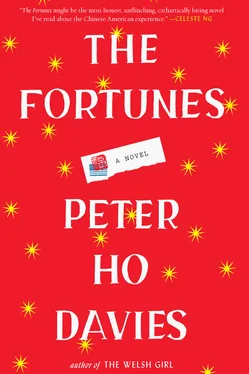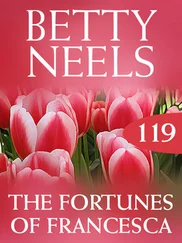It was a gruff, almost begrudging offer, but to Ling it was as if he’d struck gold.
Uncle Ng was ironing when Ling told him of Crocker’s proposal. “Bird matters,” the old head opined, waving them away. But he paused for a long moment, the smell of hot cotton, with its sweet trace of burnt sweat, rising around them, until Ling thought the shirt must be scorched.
“I have been meaning to speak to you,” Ng said at last, as if to the shirt he was smoothing again. “You know I have no son. I would adopt you.”
“I have a father,” Ling began.
“The man who sold you to me?” Ng sipped, spat. “Or the one who sold you to him? Who sells a son? A daughter maybe, not a son.”
“I don’t believe you,” Ling cried. Big Uncle had favored him, he was sure.
Ng shook his head without lifting his eyes from his work.
“The girl came of age to work. You cost less than another girl. Also, you spoke Melican.”
“It’s not true!” But he knew it was; he could already feel the tears rearing in his eyes, clamped his jaw to stanch them.
“If you were my son,” Ng went on, working the iron in circles now as if polishing the cloth, “you would inherit the business when I die.”
And tend to your spirit, Ling thought dismally.
Ng was folding the shirt now into a neat square of cloth with just his fingertips, the movements suddenly nimble after the clenched effort of the ironing. He pulled another shirt from the pile and set to it with a fresh iron. Over his bowed head, among the rough beams, Ling saw the metal hook gleaming dully.
“But… I mean to be rich.”
The old man bent once more to his ironing, the board groaning under the pressure.
“The girl,” Ng added presently. “You would own her too, of course.”
Ling was wrapping his few clothes tightly into his bedroll. Now he paused.
“Did she know about me?”
Ng shrugged. “She’s a whore, not a fool.”
Both of them sold, Ling thought. But her as a prostitute, him as a son. He secured the roll with twine, slung it on his back.
“I don’t want,” he managed at last, “to own her.”
“Love, is it?” Ng spat on the shirt before him, as if the issue were no more than a particularly obstinate crease.
“You don’t believe in it.”
“Of course I do. Men love gold, don’t they? But gold can’t love them back. Only a damned asshole thinks that.”
They stared at each other then, the old man’s knuckles whitening around the handle of his iron.
“Don’t try to stop me,” Ling warned. “I’ll drown you in your own dirty water.”
“I never told you,” Ng said at last, setting the iron down and lighting his pipe from the stove with a spill of paper. “That Frenchman, the Frog, the one with the shirt? He was my friend before. His claim was next to mine. Neither of us had any luck. Not in the creek, not in town. The Melicans called him foreigner too, made fun of his English. Same as me. Once when I caught two fish I gave one to him. Another time we shared a rabbit he trapped. We both enjoyed frogs’ legs. No gold, maybe, but plenty frogs in that creek.” He took a long draw on his pipe, exhaled smoke. “I called him friend. He called me brother. Fraternité, he taught me this. And he was the one said they should let me in the saloon, join the game. Egalité, that was another of his words. But after, when he beat me, made a fool of me, strutting around in his clean white shirt, calling me Madame, washerwoman, he was one of them. You understand?” Ng looked up at last, all three of his eyes narrowing. “I might as well have washed him, I made him so white.”
“So?”
“So.” Ng unclamped his teeth from his pipe, blew the fine hair from his mole aside. “You’ll be back.”
Ling had flung out the door. He stood panting in the street for a long moment, then turned on his heel, marched to her lean-to, and knocked heavily.
“Crocker?” she asked when he told her breathlessly about the new job. She stretched her arms wide. He nodded. “Seen your elephant, I reckon.”
In answer, he put the gold piece Crocker had given him in her hand.
For a moment they both stared at it on her palm — a woman in profile, as if looking away — and then Little Sister’s hand closed over it like something naked to be covered. With her other, she pulled him into her crib. He heard the shutter snap closed behind him.
She smelled of lye and lemon, so clean he hesitated to touch her. When he did reach for her, he couldn’t help but examine her for marks, as if he might have smudged her. He started with her blemishes, the puckered spots on her arm where she had burnt herself with the iron. He kissed them. He had those scars; she touched him back. Her hands were soft, except for the pad of her index finger, swollen purple from the pinpricks of mending. She winced slightly when she closed her hand around him. I’ll buy you a thimble, he vowed, and she lowered her head, her hair lapping across his thighs.
Afterward they were silent, lying side by side, staring at the dark ceiling. When he tried to pull her close, she seemed limp and heavy in his arms, as if waterlogged. He thought of his coin again, where it had been — in whose hands, whose pockets and purses, before it came into his, and into whose it would now pass. It made him feel flimsy, insubstantial, this small gold piece. It made him want more, so many that no one coin could ever be so important to him again. And he wondered if he’d spent it wisely (certainly he’d spent it quickly, he reflected with chagrin). He had thought he’d been courting her, but perhaps it was really the coin he’d courted.
Courted? A nice word for it.
He pictured the coins of his home, the holes at their center so that they could be threaded on a braid for safekeeping. American coins had no such hole and they seemed always to be slipping away.
He wished she’d give it back, and when she didn’t, when she rose and rinsed and dressed and still didn’t give it back, he hated her a little. He could ask for it, but he was afraid of being refused. She wasn’t worth it, he thought abruptly, though even now he knew he’d give her another coin when he earned one, and another after that, though he’d never save them long enough to buy her outright.
And she knew it too, he could tell. Suddenly he could feel the anger emanating from her, shimmering like heat from an iron. It was there in the stiffness of her movements as she brushed the tangles from her hair, the determination with which she avoided looking at him or talking to him, except to say, “Time’s up.” She wound her hair into a tight knot, jabbed a chopstick through it. He’d roused himself then, leapt from the bed really, and pulled on his clothes so roughly that he’d torn the stitches under the arm of his shirt. They’d both stopped at that sound of tearing, for just a moment. He might have asked her to mend it, she might have said yes, but then it was too late.
“Don’t look at me like that,” she told him at the door.
“Like what?”
“Like I cheat you. Like I got cards up my cunt, a finger on the scale. Can’t I make money too?”
“You wanted me to go,” he reminded her softly.
She was shutting the door on him. “I want you to go now.”
“I’ll be back,” he whispered through the gap.
“I’ll be here,” she replied bitterly.
In the morning, he thought in the dark alley, she’d wash him off, and he was glad he wouldn’t be there to watch.
6.
The Crocker household consisted of Crocker himself, Mrs. Crocker — a pale, grave presence — and their three children, but on that first day Ling was greeted at the back door by the maid-of-all-work, a florid Irish girl called Bridey. She had been waiting for him on the back porch, arms crossed stoutly over her bosom like a barred gate. Ling had mistaken her for the lady of the house at first, bowed and called her Madame Crocker, and she’d snorted, though a hand had loosened from the knot across her chest, floating up to pat her hair coquettishly. She wasn’t flirting with him so much as admiring herself in the mirror of his error, as if he were no more than a puddle or a window she’d caught sight of herself in.
Читать дальше












